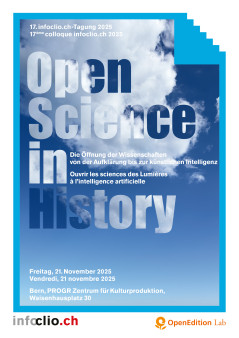Open Science challenges researchers with increasingly complex decisions regarding the sharing of their research results, methods, tools, and data. The infoclio.ch Conference 2025 explores the intellectual and technical precursors of Open Science and discusses the practical challenges of its implementation in the age of generative artificial intelligence models.
Taking a longue durée perspective, the first session looks back at the scientific revolution and the upheavals of the 18th century. Two historians analyze the development of scientific communication and the role of science in society, from the first scholarly journals of the 17th century to Kant and Humboldt.
The second session focuses on the impact of computers and digital networks on the opening up of the sciences to the public since the 1960s, homing in on the emergence of new actors in the scientific community. The contributions address the production and dissemination of digital data in the field of history in France and Germany.
Taking a global perspective, the third session highlights the geographical and social inequalities of certain Open Science models and discusses the extent to which these are unsuitable for the humanities. The speakers propose ways to make the production of and access to knowledge in the humanities more socially equitable.
The two panel discussions focus on the practical aspects of implementing Open Science. The first discusses opening up participation in the sciences to new actors from civil society. The second panel focuses on cooperation between universities and libraries in promoting Open Science, particularly in research infrastructures.
All conference contributions will be simultaneously translated into English.Programme
Session 1: The Beginnings of Open Science
Session 2: A Technical History of Open Science
Session 3: Going Beyond the Limits of Open Science
Veranstaltungsort
Kontakt
Zusätzliche Informationen
Kosten
Anmeldung
